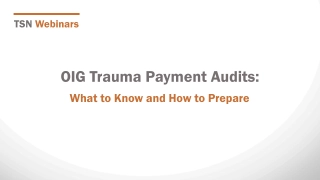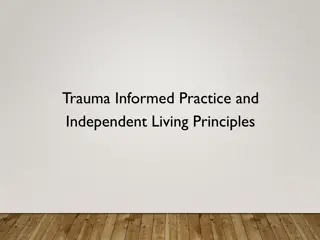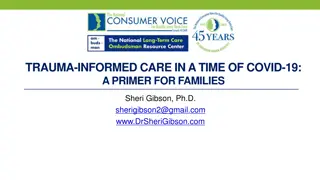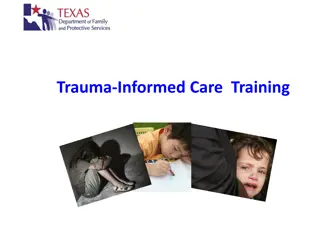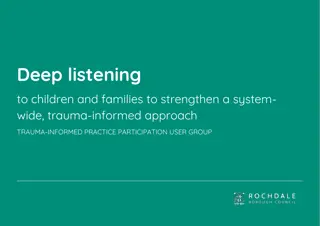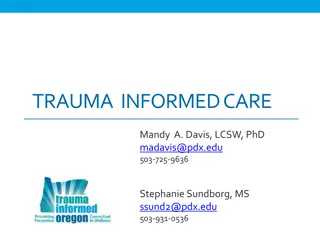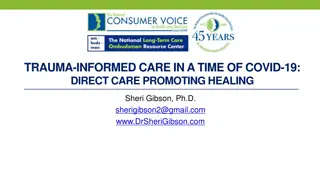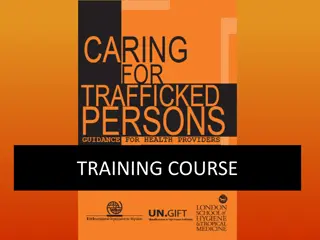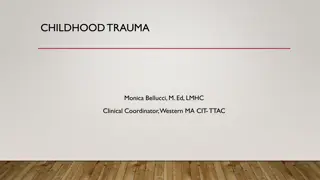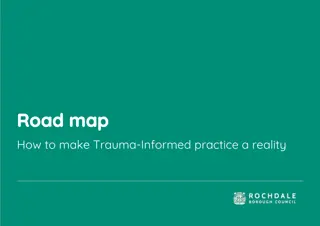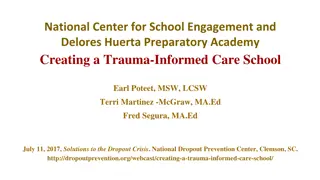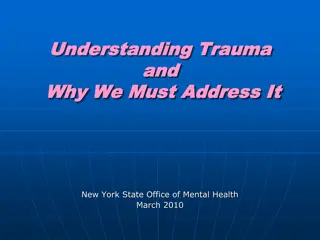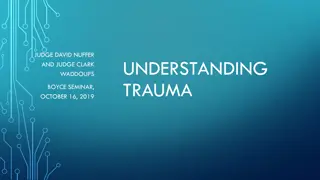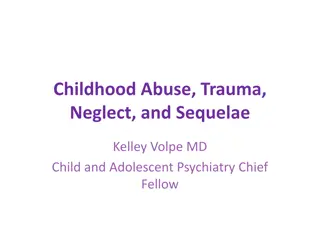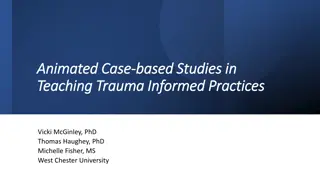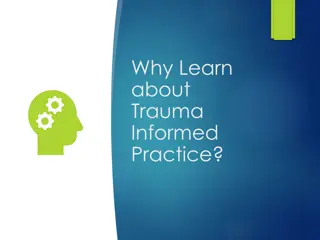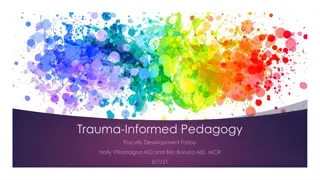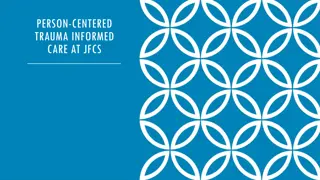Understanding the Effects of Trauma on Health: Insights from Trauma-Informed Care Implementation
Individual trauma and adverse childhood experiences can have lasting effects on mental, physical, social, and emotional well-being. The Trauma-Informed Care Implementation Resource Center provides valuable insights on defining trauma, examples of traumatic events, prevalence statistics, and types of adverse childhood experiences. Understanding trauma is essential for providing effective care and support for individuals impacted by such experiences.
Download Presentation

Please find below an Image/Link to download the presentation.
The content on the website is provided AS IS for your information and personal use only. It may not be sold, licensed, or shared on other websites without obtaining consent from the author. Download presentation by click this link. If you encounter any issues during the download, it is possible that the publisher has removed the file from their server.
E N D
Presentation Transcript
Understanding the Effects of Trauma on Health Trauma-Informed Care Implementation Resource Center is a Center for Health Care Strategies website developed with support from the Robert Wood Johnson Foundation. The views expressed here do not necessarily reflect the views of the Foundation. TraumaInformedCare.chcs.org
Defining Trauma Individual trauma results from an event, series of events, or set of circumstances that is experienced by an individual as physically or emotionally harmful or life threatening and that has lasting effects on the individual s functioning and mental, physical, social, emotional, or spiritual well-being. Substance Abuse and Mental Health Services Administration (SAMHSA) 2 TraumaInformedCare.chcs.org
Defining Trauma Adverse Childhood Experiences (ACEs) are stressful or traumatic events, including abuse, neglect, and household dysfunction, that occur during childhood. Toxic Stress is a stress response that occurs when a person experiences strong, frequent, and/or prolonged adversity without adequate support. Source: Substance Abuse and Mental Health Services Administration; Center on the Developing Child at Harvard University. Key Concepts: Toxic Stress. 3 TraumaInformedCare.chcs.org
Examples of Trauma Examples of trauma include, but are not limited to: Physical, sexual, and emotional abuse Childhood neglect Living with a family member with mental health or substance use disorders Sudden, unexplained separation from a loved one Poverty, discrimination, and historical trauma Violence in the community, war, or terrorism Source: Key Ingredients for Successful Trauma-Informed Care Implementation. Center for Health Care Strategies. April 2016. 4 TraumaInformedCare.chcs.org
Prevalence of Trauma: Adverse Childhood Experiences Study In 1998, more than 17,000 Kaiser Permanente members took the Adverse Childhood Experiences (ACE) Survey. Results: Two-thirds of respondents had experienced one or more types of ACEs. Of those: 12.5% experienced 4+ ACEs 87% experienced 2+ ACEs 22% experienced 3+ ACEs Source: Relationship of Childhood Abuse and Household Dysfunction to Many of the Leading Causes of Death in Adults. American Journal of Preventive Medicine , Volume 14 , Issue 4 , 245 258. 5 TraumaInformedCare.chcs.org
Types of Adverse Childhood Experiences in the ACE Questionnaire Substance abuse among household members Parental separation or divorce Mental illness among household members Physically abused by a mother or step-mother Criminal behavior among household members Abuse psychological, physical, or sexual Neglect, both emotional or physical 6 TraumaInformedCare.chcs.org
Prevalence of Trauma: Philadelphia Urban ACE Study In 2012 a racially diverse sample of men and women in Philadelphia took a questionnaire that was based on the original ACEs Survey. Respondents were mostly between the ages of 35 and 64, and had completed high school. Results: More than four out of five respondents experienced at least one ACE: 83% experienced 1+ ACEs 37% experienced 4+ ACEs Source: Findings from the Philadelphia Urban ACE Survey. Robert Wood Johnson Foundation. September 2013. 7 TraumaInformedCare.chcs.org
Impact of Trauma: 4 or More ACEs = Tipping Point Compared to people with no ACEs, those with a score of 4 or greater have increased risks for: Chronic Obstructive Pulmonary Disease: 390% greater risk Sexually-Transmitted Infections: 240% greater risk Smoking: Twice as likely Suicide Attempts: 12 times more likely Alcoholism: 7 times more likely Injecting Street Drugs: 10 times more likely Total estimated lifetime costs associated with one year of child maltreatment: $124 billion Source: The Adverse Childhood Experiences Study the largest, most important public health study you never heard of began in an obesity clinic. ACEs Too High. Centers for Disease Control and Prevention. 2012. 8 TraumaInformedCare.chcs.org
Impact of Trauma: Health, Behavior, and Life Potential ACEs can have lasting effects on Health - obesity, diabetes, depression, suicide attempts, STIs, heart disease, cancer, stroke, COPD, broken bones ACEs have been found to have a graded dose-response relationship with 40+ outcomes to date. 5 Risk for Negative Health and 4 Well-Being Outcomes 3 2 Behaviors - smoking, alcoholism, drug use 1 0 Life potential - graduation rates, academic achievement, lost time from work # of ACEs *This pattern holds for the 40+ outcomes, but the exact risk values vary depending on the outcomes. Source: Centers for Disease Control and Prevention, About the ACEs Study . Available at: https://www.cdc.gov/violenceprevention/acestudy/about.html 9 TraumaInformedCare.chcs.org
Impact of Trauma: ACEs and Neurobiology Traumatic experiences in childhood and adulthood invoke flight, fight, or freeze responses Responses become toxic when turned on for too long (constant flood of adrenaline and cortisol) Prefrontal cortex development may become stunted Traumatic experiences can cause people to see the world as a place of constant danger resulting in fear, anxiety, depression, anger, etc. Find solace in alcohol, tobacco, drugs, food, high-risk behaviors, etc. Source: Centers for Disease Control and Prevention, About the ACEs Study . Available at: https://www.cdc.gov/violenceprevention/acestudy/about.html 10 TraumaInformedCare.chcs.org
Learn More This presentation is a product of Advancing Trauma-Informed Care, a national initiative focused on better understanding how trauma- informed approaches can be practically implemented across the health care sector, made possible by the Robert Wood Johnson Foundation and led by the Center for Health Care Strategies (CHCS). CHCS is a nonprofit policy center dedicated to improving the health of low-income Americans. For more information, visit CHCS Trauma- Informed Care Implementation Resource Center at TraumaInformedCare.chcs.org. 11 TraumaInformedCare.chcs.org


